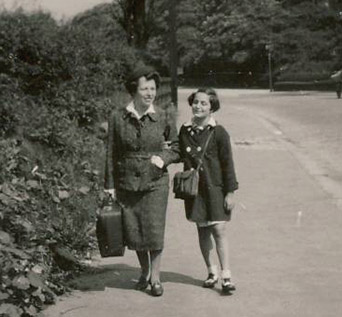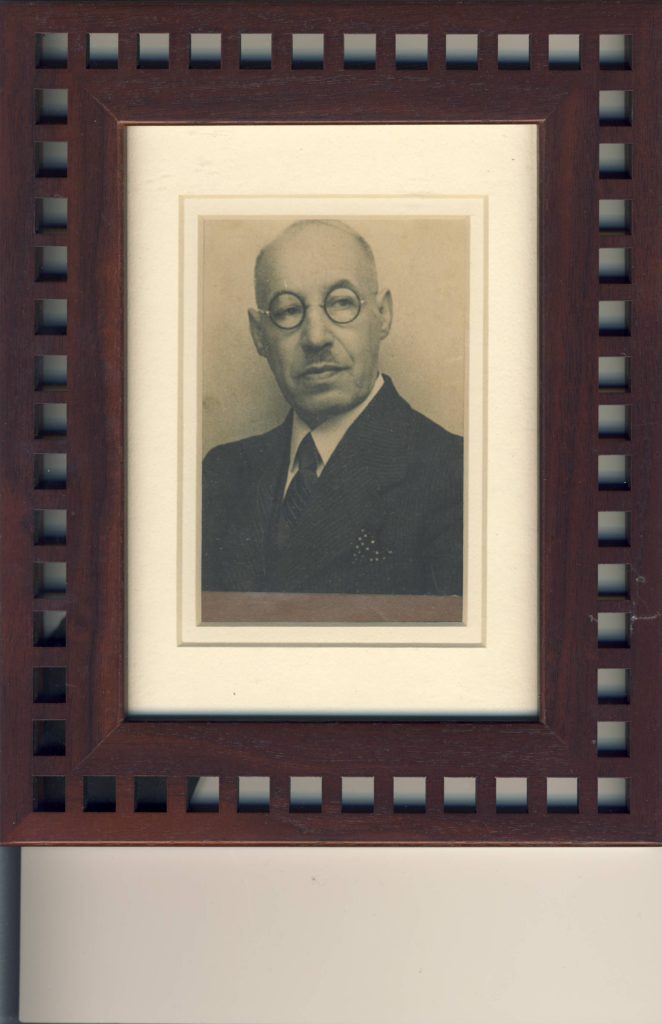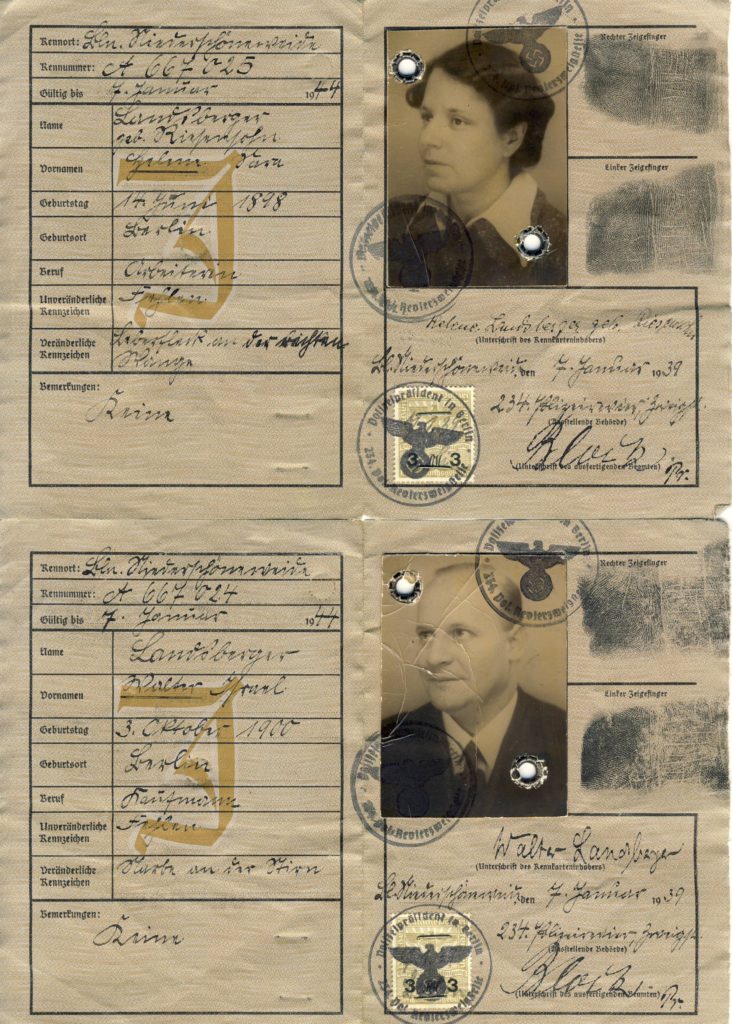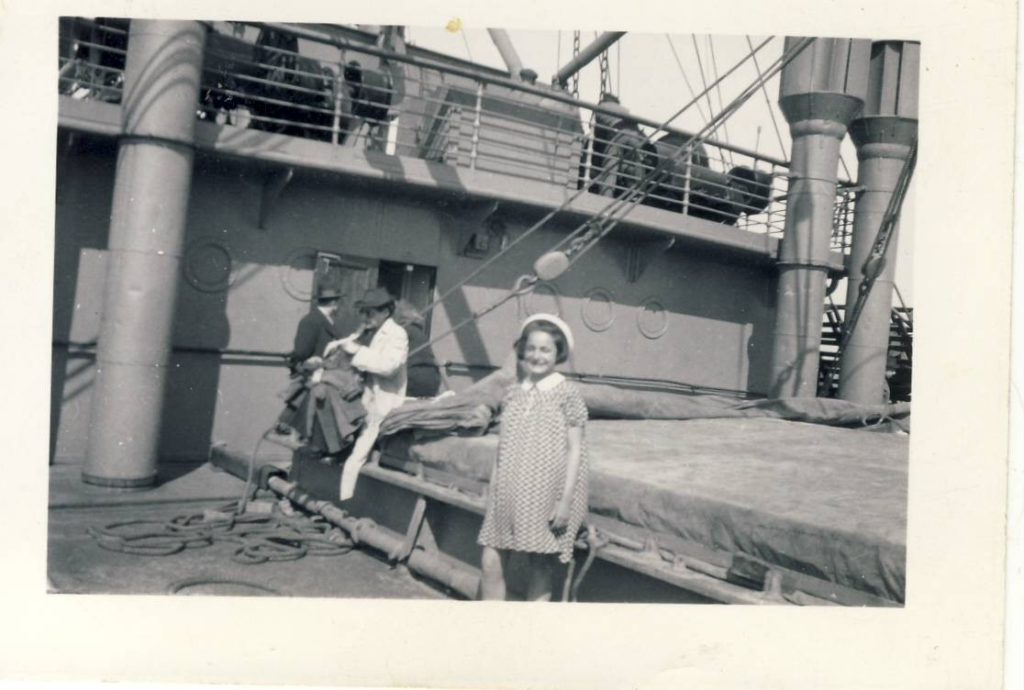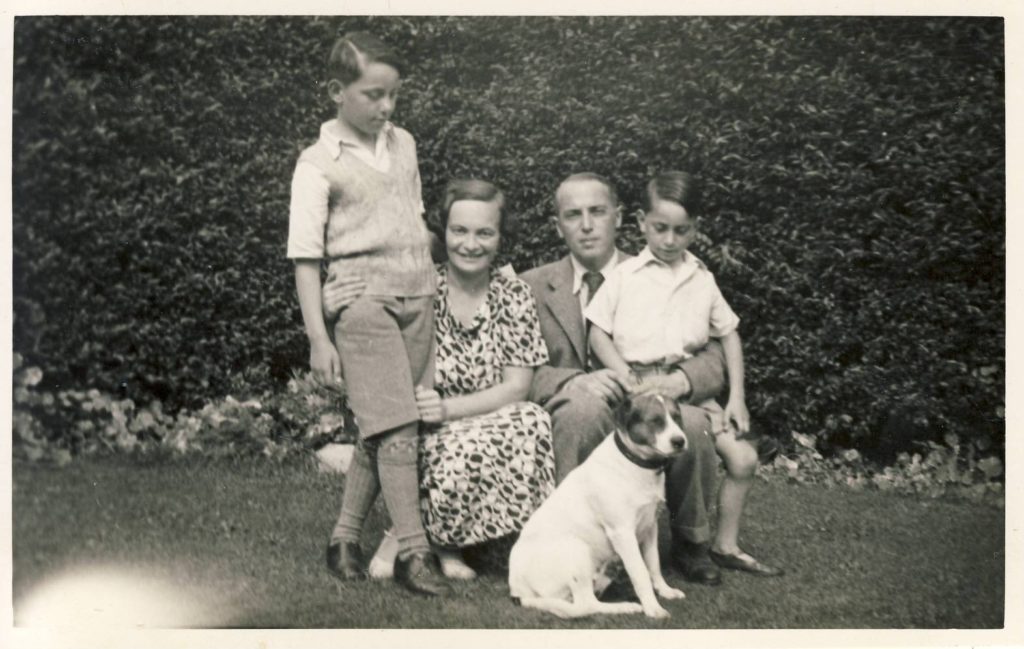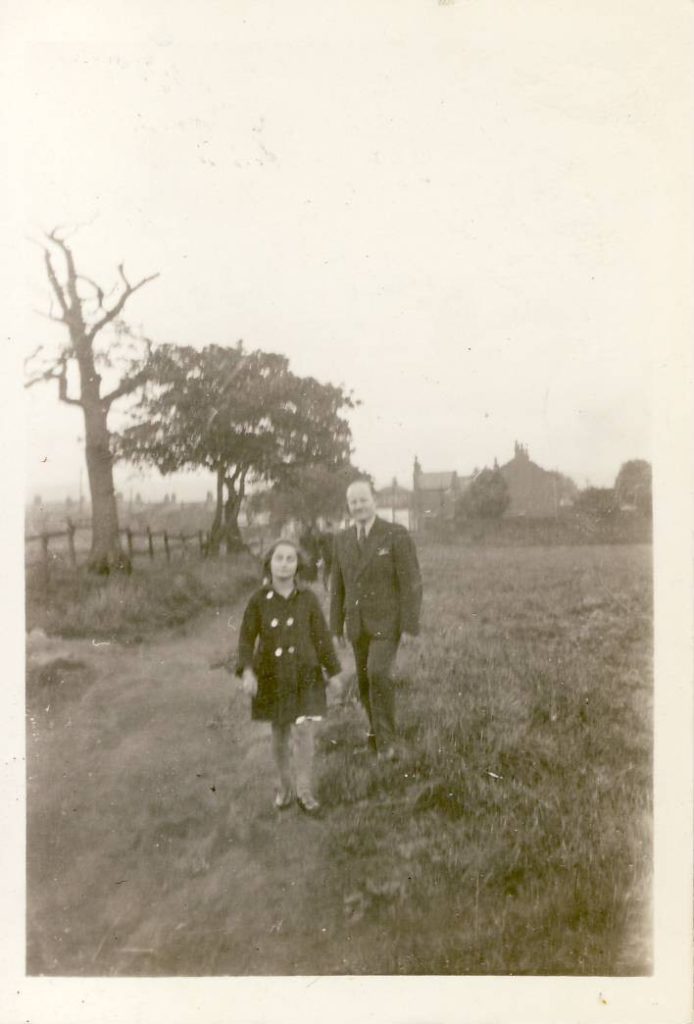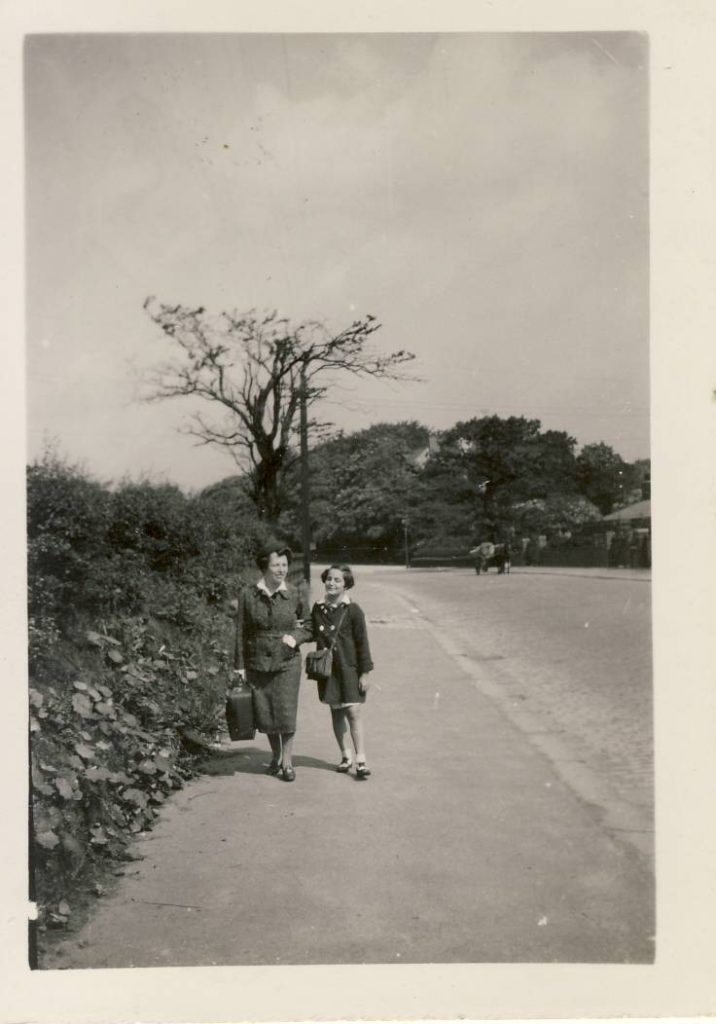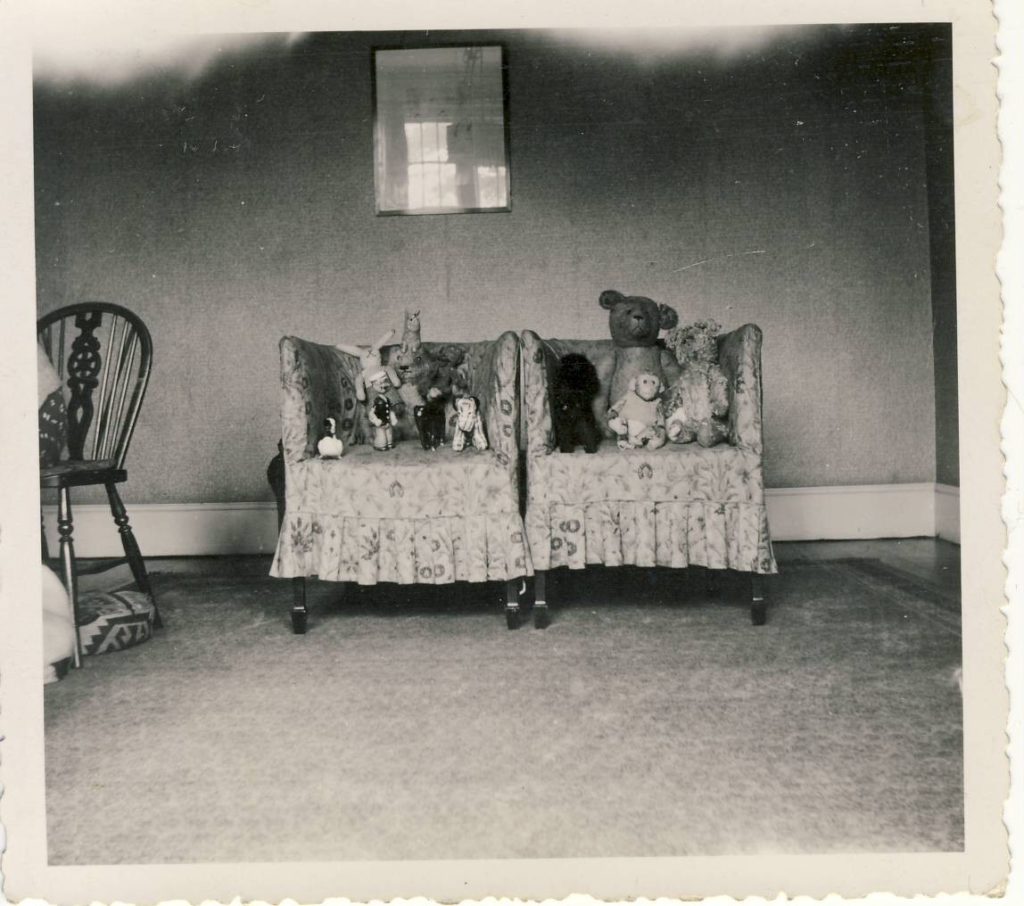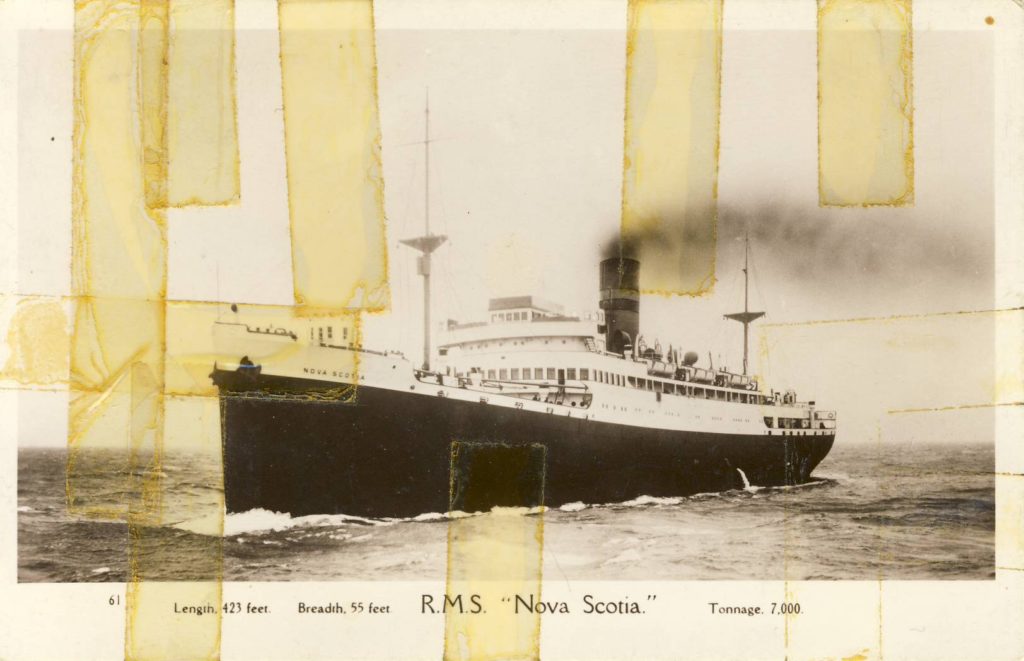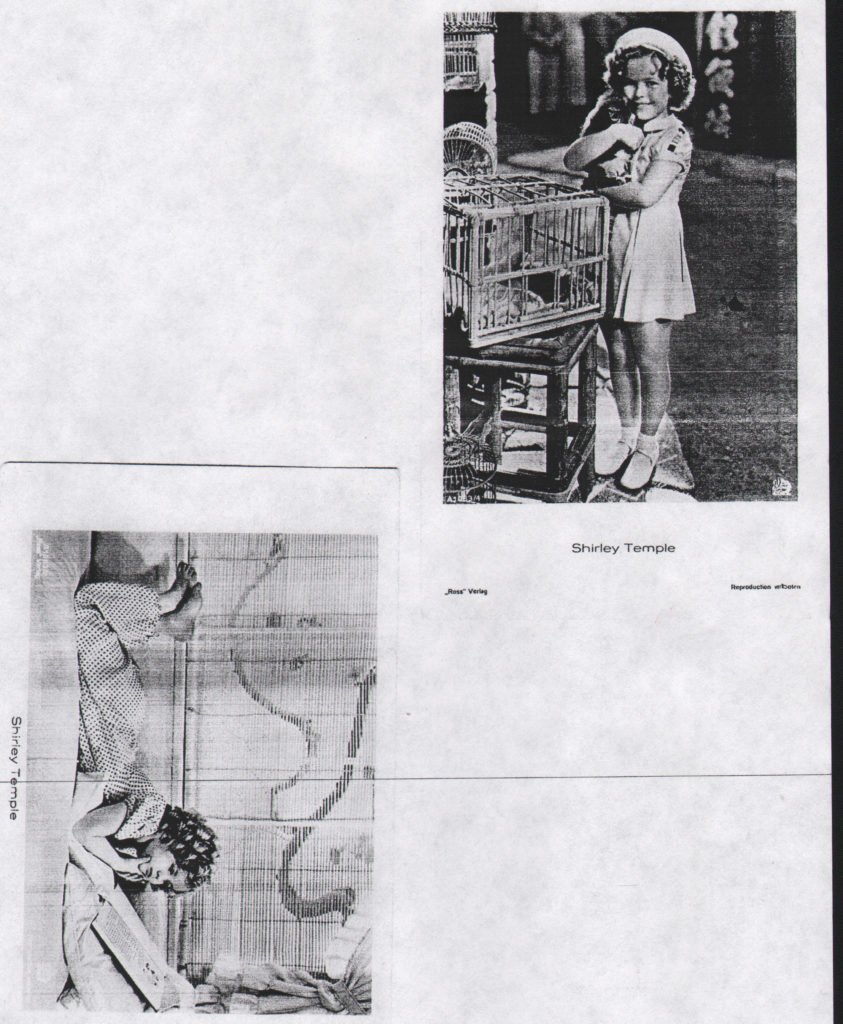Wagman: I’m interviewing Eva Wilde on September 26, 2008, for the oral history project of the St. Louis Holocaust Museum and Learning Center.
Wagman: What was your name at birth and where were you born?
Wilde: ___________, Germany. My name is Eva Landsberger.
Wagman: So what were your parents’ names and their occupations?
Wilde: My mother was Ellen Landsberger and Walter Landsberger. My dad had his own business and he selled. He sold, uh, let’s see, how should I put it…sold material for decorating store windows, and all kinds of _________ paper decorations, just for store windows. I don’t know if he sold manikins, or things like that. But mostly paper to decorate store windows.
Wagman: And your mother?
Wilde: My mother was __________. She did ___________, my mother was secretary. She worked as a young woman, she worked as a secretary, and then later on when she couldn’t get a job anymore, she worked at the temple in downtown Berlin, at the temple. ______________ at the temple ‘cause my dad’s business was going down. _______ wasn’t about to work. She always worked, which was kind of unusual at that time, while I was going to school. I came home; she wasn’t home yet. She always had a little treat for me, every day when I came home from school and she wasn’t there. Instead of her there would be like a piece of candy or a cookie or something so I would feel not lonesome. I had wonderful parents.
Wagman: What was life like in Berlin when you were young? Daily life.
Wilde: Perfectly nice. Very nice. I had a wonderful family. We never had a lot of money, but we had nothing but love and affection. I was the only child so I got all the spoiling. I had a very perfectly nice childhood. I went to nursery school. We lived in the suburbs. So it was a very nice…My parents tried to keep things away from me _________.
Wagman: How did they do that?
Wilde: Well, they didn’t dwell on the Nazi thing. I guess the first time I knew about it was when I couldn’t keep going to the school that I was going to. I went to a regular school and then I had to change to a Jewish school.
Wagman: What year do you think that was?
Wilde: Uh, gosh, I don’t know. It was about ’38. Something like ’38, ’39. I went to school in Berlin downtown which was a Jewish school, which was a lot harder
because it was far away from home and I had to take, I had to take two trains to get there all by myself. I was a smallish child, so my dad used to take me to the station every day. 7:15 is when the train left, and so I was quite a responsible to do that, but you didn’t have any choice. You had to go to the school. That’s when I was alerted to all this, this Nazi business. But I really never, they never dwelled on it. I didn’t have any, as I remember that time, no bad experiences. So…
Wagman: What were your recollections of the city before the war, such as relationships between Jews and non-Jews?
Wilde: I have no – I was too small to worry about it. We went to temple. I believe my parents were active. I remember one year for Hanukah, our whole house was full of toys. We were collecting toys for poor children, Jewish children, for Hanukah. As far as I knew, life for me it wasn’t much different. It really wasn’t. They didn’t. I didn’t get. They didn’t talk about it in front.
Wagman: What was your family’s political affiliation and what was religious life like?
Wilde: We were not orthodox. We were reform. My grand…we had Friday night services at my cousins’ house. My grandfather was orthodox – he was quite learned and he would do the service. But we never had, we never kept a kosher house. We celebrated holidays but we were not orthodox. My grandfather was the one that had the service on Friday night. My cousin came to that with her family. That was about the extent of it, and we did go to temple, but _________
Wagman: What was the family’s political affiliation?
Wilde: I really don’t know. I was 11. I didn’t know, what was, those things. I suppose they were – I don’t know.
Wagman: Once you started going to the school in Berlin, how did you grow aware of Nazi presence in the city?
Wilde: I really didn’t.
Wagman: You really didn’t.
Wilde I really didn’t. I mean, I knew about it. I guess Kristallnacht was the time that I really knew what was going on and how that affected us, but as I said, it didn’t not change our life except when I went away…
Wagman: What do you remember about Kristallnacht?
Wilde: Well, I don’t know, did you go to that program they had? Well I remember walking around with my dad at night, not going home, and wondering why that was and…and I knew something was wrong. After that I didn’t have any terrible experiences, except I knew something was wrong. Why didn’t we go home?
Wagman: Can you tell me more about that story? Your dad was walking you around?
Wilde: Well, we went walking, because we couldn’t go home, and I couldn’t understand why we didn’t do that.
Wagman: So where were you walking?
Wilde: We just walked around town to different places and we stopped in different areas. They had some meals and things set up in the different houses. I know we had dinners there. I don’t remember exactly where we went, but we didn’t go home so that was…until the next morning.
Wagman: Okay. Was it the three of you – you and your father and your mother?
Wilde: Yes.
Wagman: How old were you then?
Wilde: I suppose. Well, Kristallnacht was November what was it…?
Wagman: ’38.
Wilde: ’38. I was eleven….I guess I was about nine.
Wagman: How did you become aware of your parents’ plans to leave Germany? How did they explain that to you?
Wilde: Well, my mother had a distant relative who had friends in London. And she asked them if they would take a child. And they found a family and for a couple of weeks they would write back and forth and they even sent pictures of the children and they even sent pictures of the toys that I would be seeing ‘cause it was…I was prepared in that way?
Wagman: What toys…what did they send?
Wilde: They sent pictures of dolls and teddy bears and things that I would be seeing. It was good – they were wonderful people.
Wagman: Do you remember when your parents first explained to you that they were writing a family and doing that or how did they tell you?
Wilde: No, I think…I don’t know. They just explained it. I really don’t
remember if I understood exactly. I mean, of course I did. But we tried not to – they of course tried everything not to make it too upsetting. That was the whole thing behind it – it must have been terrible, the hardest thing they ever did in their lives – to send your children to….at least they knew it was a family they had written to or talked to or, of course, my parents didn’t know any English either or anything like that. But those people, the woman spoke a little German, so they got along. Anyway, it was not a total stranger.
Wagman: Did you know English?
Wilde: No.
Wagman: No. What was the journey like, when you went to England? Do you remember getting on the ship?
Wilde: I remember, well the hardest part I guess was to the train station, to say good-bye to my parents. That was the hardest part.
Wagman: What do you remember?
Wilde: I just remember being at the platform and, tried, tried not to have a tearful goodbye for my parents. That must have been just horrendous, the worst part. There were a lot of children we met. We took a train to Hamburg and then we went to, it was a group of children. And on the boat, I don’t remember too much about the boat except we were all together. And, I remember mostly getting off the boat. We stopped in __Lahal?_______, France, and I remember going to the….what is it…outside the boat was docking for a while, a couple of hours…looking over the water and there were children waiting on the dock and we thought we had more stuff than what they did. They were holding out their hands for – whatever, candy or bread or whatever. We didn’t have any but we felt like we were richer than they. I still remember that. And then getting to London.
Wagman: Did you have any possessions with you?
Wilde: I had a suitcase.
Wagman: A suitcase. Do you remember what you took with you?
Wilde: I took some clothes, mostly. And there were – I remember when we got there. She was surprised, they were nice clothes. We didn’t – it wasn’t these pauperish kind of people that came over, you know? She said, oh, you have such nice things. Of course, my mother dressed me nice. It wasn’t like, some refugee, you know. So, no, but the only thing I remember was the man that picked me up – my foster father, whatever you want to call him. He came by himself to the railroad station where we first got off. I remember he was a tall Englishman with an umbrella.
Wagman: What were you thinking?
Wilde: I don’t know. What does a kid think? I was thinking, I wonder what it’s going to be like. Where are we going? I remember sitting with him in the train compartment. He was sitting on one side and I was sitting on the other. I don’t know – he didn’t say very much. I really don’t remember too much. We had a conversation. I didn’t know any English. I don’t know what he was thinking. He was probably checking me out or thinking what…(laughs)…anyway, I don’t know, I really don’t know.
Wagman: How old were you when you reached England?
Wilde: I was eleven.
Wagman: Was this family Jewish?
Wilde: Yes. They were Jewish but they were Russian __________. They
had two boys.
Wagman: How old were the boys?
Wilde: One of the boys were close to my age, about a year younger. The other boy was older. And we got to be good friends.
Wagman: Both of…with both?
Wilde: The older boy, not so much. He was afraid people would think I was his girlfriend. Nobody wanted that. Nobody wanted that, at that age.
Wagman: What was daily life like with their family?
Wilde: Daily life was…they were a very nice family. They sent me to a private school. I took a bus to school, the green line, which was a very…. They lived in a suburb, a very nice house.
Wagman: Which suburb?
Wilde: Uh, Woldingham-Surrey. It was a beautiful place. Really very nice. The only person I had trouble with was… The younger son was called Michael. His girlfriend. ‘Cause she was jealous that I was there (laughs). I had to fight her the first day!
Wagman: You had to fight her? How did that happen?
Wilde: Well, I could see that she didn’t like me being there. I couldn’t speak English, but it was understood that she didn’t like the idea of another girl there with Michael. I think she was – maybe eight – I don’t know.
Wagman: Was it a physical fight?
Wilde: Well, you know how kids fight. Two minutes. It was perfectly….it was not a serious occasion (laughs).
Wagman: What was it like meeting the foster mother?
Wilde: Oh, she was a very nice, friendly woman. She talked a little German so that’s what made it easier.
Wagman: What did they do?
Wilde: I really don’t know. He was a businessman. He would go off in the morning and come back at night and that was it. He had nice… It was just a very nice family he had. It was just, you know, she stayed home, took care of the family. And he would go off every day and come back at night. The thing that impressed me the most I guess was that they had two grand pianos (laughs). I think – that was one of the things that I really liked, just about the house. They had a two-story house and two grand pianos.
Wagman: Had you taken lessons before?
Wilde: Yes.
Wagman: Back in Berlin?
Wilde: Yes.
Wagman: Did they all play in their family?
Wilde: The boy was very talented, the older boy.
Wagman: How did their daily life differ from the life you had with your parents in Berlin?
Wilde: I don’t know. The lady did not go to work, not like my mother. And it was a house rather than an apartment. They were wealthier than we were – at least that’s what it seemed to me. But it was a very nice family life and nothing unusual.
Wagman: Had they been established in England a long time?
Wilde: I don’t know. I just, kids don’t ask those kinds of questions.
Wagman: Right, of course. What was the adjustment like for you?
Wilde: Well, it was…the main adjustment I think was in school. I didn’t know any English. I didn’t know the kids. It was all strange. We had to where a uniform to school. I went to a bunch of schools in England. The school was…I don’t remember too much about the actual learning but we had our own ______, we had our own yard, we had our own plantings, we had our own hockey games. The headmaster took interest in me and tried to teach me English. I went to his office every day and he would try to give me English lessons. But that really didn’t work out too well. ‘Cause the real way that you learned to speak a language is when you just do it. Like that friend of Michael’s — I learned more just talking and learning. In a few months I learned to speak perfectly. Didn’t take long. You just learn by doing.
Wagman: How did you hear of your parents during this time.
Wilde: Well, my parents were very lucky. They got a job in England as a domestic couple, which was one way that they had to get out of Germany. And so, after a
few months, I found out that they were coming to England – to an entirely different part of town. So we did not…when they came to England, I saw them briefly at the station. We picked them up from the station. But I couldn’t stay with them ‘cause they had this job in a different part of England as a domestic couple. My mother, my dad had never been doing that, was now a butler and uh (laughs), and my mother was a cook. ‘Cause it saved their lives. So that’s why they did it. So, that’s, there was __________ when the war broke out and they had the air raids, I was evacuated to them, where they were working. ‘Cause that was a raid, we were near ___________airport___.
Wagman: What town were they in?
Wilde: We were in Bolton, Lancashire, which was different from Surrey where I was, near Surrey, which was near _________airport__, and it was more dangerous, near London. So I was evacuated to them.
Wagman: Before they came over, did you talk about them? Did you talk about life in Germany to the foster family?
Wilde: No, never.
Wagman: What kinds of conversations did you have?
Wilde: We didn’t have those kinds of conversations.
Wagman: With the foster family.
Wilde: No.
Wagman: What did you talk about?
Wilde: We talked about everyday things: how was school? What did you
do? What did you learn today? I was never. We never went. This was all in the mind, and understood in their minds but they were not going to talk to me about it.
Wagman: Did you make friends at school?
Wilde: Not very much. I really didn’t. I was a newcomer. I don’t know why, there was a little girl, who for some reason didn’t like me. She would follow me every day after school, for some reason. And I always tried to stay away from her. I don’t know. No, I did not really. We lived in the country. There were really no other children around. It was quite…isolated. And the school was far away. So I really don’t remember making any – not in that school – didn’t make any friends.
Wagman: What was your Jewish life like in England? Were there many Jewish—
Wilde: No. There weren’t any. I never remember going to temple. I never remember them going. So…
Wagman: Did they light candles on Friday nights?
Wilde: No. I don’t think so. I don’t think they did anything like that. They had friends and family that would come over sometime, but I don’t remember doing anything Jewish at all.
Wagman: Did a lot of the children that were on the ship with you wind up in the same neighborhoods?
Wilde: No. Nobody did. They all went separate places. And to this day I think why didn’t I talk to some of those children? But everybody was in their own space. I guess when you are that age, you don’t think about that.
Wagman: How long were you – altogether – on the ship??
Wilde: Oh. A week maybe. Not that long. No, the ship was really. I don’t remember doing much, of what I can remember. Except stopping in France, seeing those other children.
Wagman: Right. Why does that stay in your mind so much, that story about the children in France?
Wilde: I don’t know. I felt for them. But I felt so far removed from those children.
Wagman: How so?
Wilde: I don’t know. I guess that’s the only thing that happened on the boat – that stopping and seeing a different country, the pier and everything. And you know, it was an adventure. I didn’t know.
Wagman: Did your parents write to you?
Wilde: Oh, sure.
Wagman: Often?
Wilde: Yes, of course.
Wagman: How often?
Wilde: My mother probably wrote almost every day. My mother was very instrumental and we always kept very close.
Wagman: What did the letters communicate?
Wilde: Oh. They just said how are you? How are you? She would tell me to be nice to the people and how to behave. It was more on my end, what I had to do. They didn’t tell me about what they were feeling. It was mostly that they wanted me to make a good impression, do the right thing and be appreciative. And then of course as they were coming close to, coming to England, then the letters got, you know, we’ll see you soon and it was really wonderful. I was _________ thrilled. Because the English people wanted to adopt me.
Wagman: They did?
Wilde: Yes.
Wagman: How did you learn that?
Wilde: My mother told me later on.
Wagman: Oh. And so what happened?
Wilde: Nothing happened. They just were glad, naturally they turned me over to my parents. But if they hadn’t gotten out of Germany they probably would have adopted me.
Wagman: Did your parents explain to you later what that time was like for them?
Wilde: I can imagine. Because at the same time my mother’s only sister also left for the United States and they were very close. It was just a terrible time. But they weren’t going to sit there and tell me all their woes.
Wagman: Right.
Wilde: (laughs) They don’t do that. It was a terrible time. I mean, just the fact that they sent me – was a terrible time – that they had to do that. You don’t send your children to a stranger’s for nothing.
Wagman: What are some of the memories you have of England? What stays with you most from living with the family?
Wilde: England it was most, I think rather fondly…
Wagman: What do you remember most?
Wilde: I remember it was great. Whenever we traveled, we always wanted to go back and see it. We did visit, in later years. We did come back and visit.
Wagman: So once the war broke out there in England, you were able to reunite and live with your parents again?
Wilde: ____________, no, they had a chance to come to the states. And so we all came here together.
Wagman: Okay. How long had you lived with the family?
Wilde: Uh, with the family, maybe close to a year. And then I was evacuated to my parents and started our voyage to the states.
Wagman: Did you live with your parents in England for a while?
Wilde: Yes.
Wagman: How long was that?
Wilde: A couple of months.
Wagman: And they were a domestic –
Wilde: They were a domestic couple until they lost their jobs because they were enemy alien.
Wagman: Enemy alien…
Wilde: (Laughs) They couldn’t work anymore, so they had to…we moved into – with an English family – into a one room. One room. And my mother got a job as sort of a nurse to a lady who was handicapped. And my father couldn’t get a job because they were enemy alien.
Wagman: Did you know what that word meant or how did…
Wilde: Yes, I knew that.
Wagman: How did you understand that?
Wilde: Well, it was because of the way. Because of war with Germany and England was afraid of people, but anyway. I knew what it was. But I knew that we ______, let us live together in one place. When they were a domestic couple, I couldn’t have lived with them. So in a way that worked out.
Wagman: How long were they a domestic couple?
Wilde: Oh, I don’t know. A few months. Almost the same time, no maybe six months. I don’t know. They got to be good friends with those people, too.
Wagman: With your foster family?
Wilde: Yeah, and with the people that employed them as a domestic couple. They were friends. Anyway, we then moved together to Bolton under one room.


